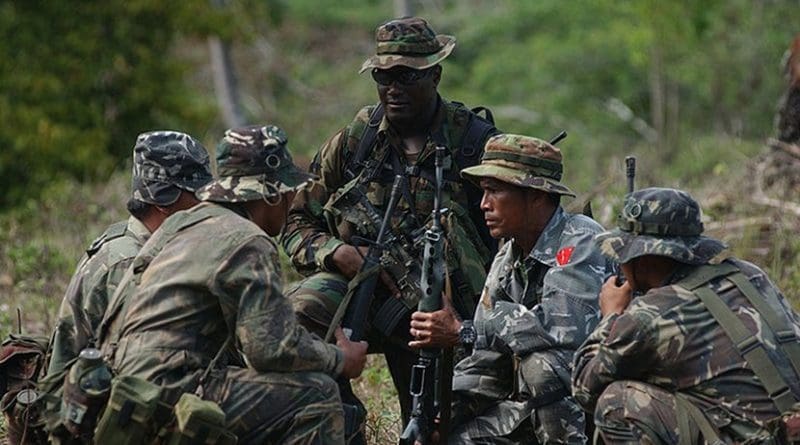Philippines Again Postpones Decision On Ending Military Pact With US
By BenarNews
By J.C. Gotinga and Marielle Lucenio
Philippine President Rodrigo Duterte has put off by another six months his decision on whether to scrap a key military pact with the United States, Foreign Secretary Teodoro Locsin Jr. said Monday, amid new tensions between Manila and Beijing over contested South China Sea waters.
The announcement by Manila – the third time since January 2020 that it has postponed a threat to withdraw from the bilateral Visiting Forces Agreement (VFA) – comes as the Southeast Asian nation has been filing daily diplomatic protests with Beijing since April over the presence of Chinese ships within the Philippines’ exclusive economic zone in the waterway.
“I have just come from a meeting with the president and Ambassador Jose Romualdez on the subject of the Visiting Forces Agreement,” Locsin said in a statement, referring to Manila’s envoy to Washington.
“The president conveyed to us his decision to extend the suspension of the abrogation of the Visiting Forces agreement by another six months while he studies [it], and both sides further address his concerns regarding particular aspects of the agreement,” Locsin said.
The foreign secretary did not elaborate on what those “particular aspects” were. The foreign office was “waiting for guidance from the [presidential] palace on the specific areas the president would like to look more closely into,” a spokeswoman said.
In Washington, the State Department did not immediately respond to a BenarNews request for comment on the Philippine move.
In January last year, the Philippine president first threatened to end the VFA after the United States revoked a visa for Sen. Ronald dela Rosa, his former national police chief who had led the Duterte administration’s controversial war on illegal drugs.
The last time the Philippines postponed the decision on the pact was in November 2020, when Manila said that bilateral efforts with the U.S. had brought “the renewal of stability” in the South China Sea.
Then in December 2020, Duterte warned that he would scuttle the pact if American pharmaceutical giant Pfizer did not deliver at least 20 million doses of the vaccine to the Philippines to help it fight the coronavirus pandemic. As of last week, the Southeast Asian country had acquired only about 2.4 million doses of the Pfizer-made vaccine.
Analysts have said it would be unwise for Manila to weaken its alliance with Washington amid China’s increasing aggressiveness in the contested maritime region.
Meanwhile, beginning in late March 2021, the Philippine government has been engaged in a verbal tussle with Beijing over the presence of suspected Chinese militia ships within the Philippines’ exclusive economic zone (EEZ).
China has denied the allegations and said its ships were fishing vessels, while reiterating that its ships were operating inside territorial waters that Beijing also claims.
Signed in 1999, the VFA allows large-scale joint military drills, which are seen as vital in Manila’s efforts to protecting its territorial claims in the South China Sea. The last such exercise was in April.
In February, Lloyd Austin, the defense chief in the new Biden Administration, reaffirmed Washington’s commitment to both the VFA and the 1951 Mutual Defense Treaty during his first official phone call with Philippine counterpart Delfin Lorenzana.
The U.S. has repeatedly pushed for freedom of navigation and overflights in the South China Sea. Washington has also sent its navy ships into the maritime region as a show of support for the Philippines and other allies in the region who use the waterway.
In April, the U.S. Theodore Roosevelt Carrier Strike Group sailed South China Sea waters to carry out maritime strike exercises, anti-submarine operations, coordinated tactical training and other activities, the U.S. Navy had said.
On Monday night, the Philippine Department of National Defense said it fully supported the president’s decision to delay his decision on the VFA for another six months.
“Our bilateral cooperation with the U.S. is geared towards upholding our national interest and to the extent necessary to enhance the Philippines’ defense capability,” Defense Secretary Lorenzana said in a statement.
“With the additional six months, we will further review the pros and cons of the VFA especially regarding various concerns of mutual importance to our two countries with the end in view of helping the President arrive at an informed decision on the matter.”

